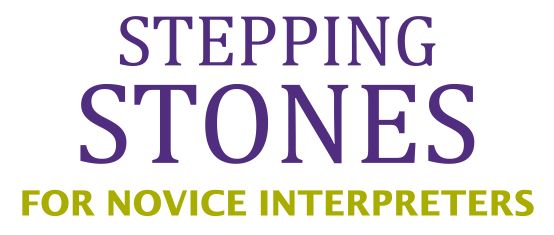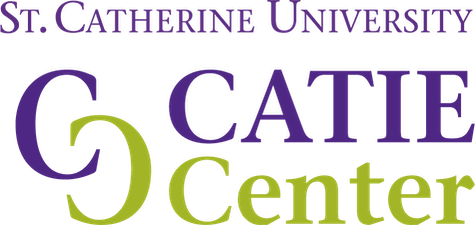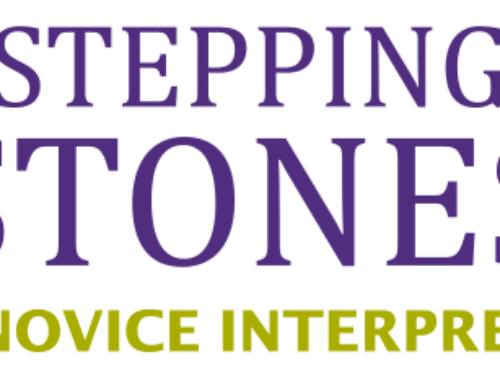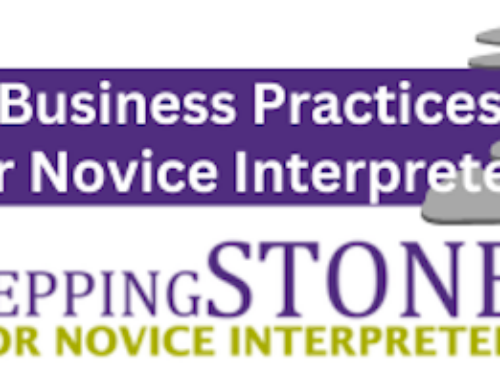
- Are you a Deaf interpreter working toward certification?
- Are you looking for support from an experienced CDI?
- Do you want to work with other Deaf interpreters with a similar goal?
Check out this free online course on preparing for the CASL exam for Deaf interpreters. It is an offering in Stepping Stones for Novice Interpreters, a self-directed track from the CATIE Center’s Dive In project.
CASLI Exam Prep for Deaf Interpreters
Description
This course provides test preparation content in manageable and distinct sections, a total of seven modules. The overall goal of this training is to help you understand the process of performance testing and practice skills that will be required on the exam so you can better prepare for the CASLI Performance Exam for National Certification.
The eight course modules are designed to provide you a structure as you prepare to sit for the CASLI Performance Exam for Deaf Interpreters. The modules are:
- Module 1: Getting Started
- Module 2: Interpreting Sample Set & Assessment 1 (Baseline)
- Module 3: Ethical Considerations
- Module 4: Methods of Message Transfer
- Module 5: Practicing Interpreting Skills
- Module 6: Interpreting Sample Set & Assessment 2 (Putting it all together)
- Module 7: Wrapping Up the CASLI Performance Exam Prep for Deaf Interpreters
The course is designed to be completed over 6 weeks, at your own pace and takes at least 15 hours to complete. Each module will have a specific focus and include opportunities for application and reflection. The course registration will be available from September 22-October 12, 2025.
Zoom Orientation
A facilitated orientation will be held in Zoom on Monday, June 1, 2026 at 4-5 pm PT/5-6 pm MT/6-7 pm CT/7-8 pm ET. Dr. Naomi Sheneman will be facilitating the course from May 31-August 31, 2026.
Learning Objectives
Participants completing this course will:
- Identify the expectations for performance testing as a Deaf Interpreter.
- Assess and reflect on their interpreting skills in order to identify areas of strength and areas to improve.
- Create a development plan to guide their preparation for a performance exam.
- Identify areas of focus and access strategies for how to approach a performance exam.
- Practice their interpreting skills in order to increase their readiness for performance testing.
A Note on CEUs
Because our grant is focused on novice interpreters working toward certification, CEUs are not offered by the CATIE Center. The CATIE Center has an agreement with the Minnesota Registry of Interpreters for the Deaf.
For $40 (a cost set by MRID), you can receive ACET or CMP CEUs for this course. At the end of the course, you will have access to a form to apply for CEUs and receive a link for making the payment. So, you don’t have to commit to making a payment until you know that you will be able to complete the requirements. (MRID members receive a free processing of a Stepping Stones workshop, a PINRA, or an Independent Study each year – so if you are an MRID member, you can get this cost waived.) For more information on the CEU process, contact pdc@mrid.org.
Minnesota Registry of Interpreters for the Deaf is an approved RID Certification Maintenance Program (CMP) sponsor for continuing education activities. This professional studies program is offered for 1.5 CEUs at the some content knowledge level.
The CATIE Center promotes a mutually respectful learning environment free of bias. See St. Catherine University’s non-discrimination policy for more details.
Registration coming soon. Facilitation will not be start until May 31, 2026.
The registration form will provide you a link to enroll in a free Canvas course. It will also ask for optional demographic information which will be helpful for the CATIE Center in evaluating the effectiveness of these resources for supporting the diversity of novice interpreters who are entering the interpreting field.
About Stepping Stones for Novice Interpreters
This course is part of a series developed by the Dive In project of the CATIE Center at St. Catherine University. Each module will have a facilitator from the CATIE Center who monitors a Support Forum. The activities are designed so that you can do them asynchronously. Though possible to do independently, we encourage you to either join as a group and work through the material together – or use the introduction forum to seek out others in the course who might work with you in the discussions. Collaborative learning can be a really important tool in professional development.



